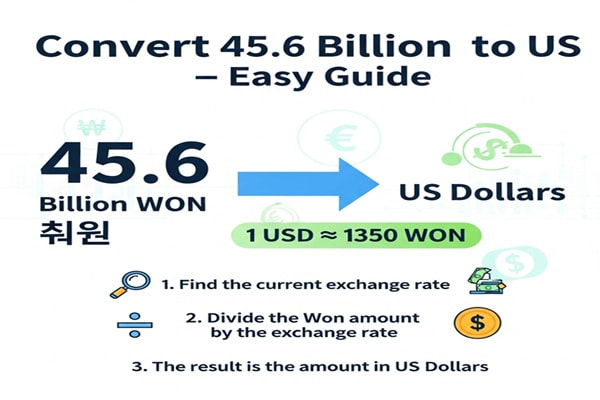Contents
When you first hear “45.6 billion won,” it sounds massive—and it is! But how much is that actually worth in US dollars? Whether you’re a curious reader, traveler, or business professional dealing with international transactions, understanding how to convert KRW (South Korean Won) to USD (United States Dollar) can save you both money and stress.
This guide breaks down everything you need to know—how conversion works, what affects exchange rates, and simple tricks to get the best value when trading currencies.
1. What Does KRW Mean?
KRW stands for South Korean Won, the official currency of South Korea. You’ll often see it written as ₩, and it’s managed by the Bank of Korea.
The won is divided into smaller units called jeon, though you won’t really see those used in day-to-day life anymore. Thanks to South Korea’s strong economy, the won plays a major role in global trade and foreign exchange.
2. Understanding the US Dollar (USD)
The US Dollar ($) is not just the currency of the United States—it’s the world’s most traded and trusted reserve currency. Managed by the Federal Reserve, the dollar’s value influences markets around the globe, including the Korean won.
So, when you’re converting KRW to USD, you’re really watching how these two economic powerhouses interact on a global scale.
3. How Currency Exchange Rates Work
Currency exchange rates show how much one currency is worth compared to another. For example, if 1 USD = 1,350 KRW, then 1,350 won equals one dollar.
But these rates aren’t static—they fluctuate constantly. The reason? Global supply and demand, political developments, trade activity, and even investor sentiment.
So, if you’re converting 45.6 billion won to USD, your result will depend on the exact moment you check the exchange rate.
4. Key Factors That Influence KRW to USD Rates
Several factors shape how much the won is worth compared to the dollar:
-
Interest Rates: Countries with higher interest rates tend to attract more investors, strengthening their currency.
-
Inflation: Low inflation usually means a stronger currency.
-
Political Stability: Uncertainty or instability often weakens a nation’s currency.
-
Trade Balances: If a country exports more than it imports, its currency tends to appreciate.
These factors explain why exchange rates can swing dramatically even in a single day.
5. So, How Much Is 45.6 Billion Won in USD?
Let’s do the math.
If 1 KRW = 0.00075 USD, then:
45,600,000,000 KRW × 0.00075 = roughly $34,200,000 USD.
That’s around $34.2 million—a substantial amount of money!
Keep in mind, this number changes as rates fluctuate, so it’s best to use a real-time currency converter before making any transactions.
6. A Look at KRW to USD Exchange History
The KRW/USD exchange rate has seen its fair share of ups and downs:
-
1997 – Asian Financial Crisis: The won lost significant value against the dollar.
-
2008 – Global Recession: Another dip, as markets worldwide suffered.
-
2010s – Steady Recovery: As South Korea’s economy grew, the won regained strength.
Tracking historical data helps investors and businesses predict future trends and manage risk.
7. Real-Life Examples of Major Conversions
To understand how currency conversion impacts daily life, consider these scenarios:
-
Corporations: Samsung and Hyundai often convert billions of won to pay for overseas operations.
-
Entertainment: K-pop agencies deal with revenues in multiple currencies from tours and streaming platforms.
-
Government Transactions: Even countries convert currencies for trade and defense deals.
So, converting billions isn’t just theoretical—it’s part of everyday global business.
8. Tools to Convert KRW to USD Accurately
You don’t need to be a math whiz. Use these reliable tools:
-
XE Currency Converter: Trusted for real-time updates.
-
Google Currency Converter: Quick and convenient.
-
Bank Exchange Calculators: Offered by most financial institutions for official rates.
These tools help you avoid guesswork and ensure accuracy, especially for large sums.
9. How Fluctuating Rates Affect International Business
Exchange rate changes can make or break international deals. For example:
-
Exporters may profit if their local currency weakens, as their products become cheaper abroad.
-
Importers might lose out if their currency loses value, making foreign goods more expensive.
-
Global Businesses use financial instruments like hedging to protect themselves from sudden currency swings.
Understanding this helps companies manage risks and make smarter financial moves.
10. Tips to Get the Best Exchange Rates
Want to save money when converting currencies? Try these:
-
Use Currency Brokers: They often offer better rates than banks.
-
Monitor Rates Regularly: Timing your exchange can make a noticeable difference.
-
Avoid Airport Counters: Their convenience comes with steep markups.
Even small differences in exchange rates can translate into thousands saved on large transactions.
Also Read : Doodflix Ultimate Streaming Experience 2025
11. Common Mistakes to Avoid
When exchanging money, be mindful of these common errors:
-
Ignoring Hidden Fees: Always check for commissions or service charges.
-
Using Outdated Rates: Ensure your data is live before making a conversion.
-
Bad Timing: Currencies fluctuate—don’t exchange impulsively without watching trends.
Being informed saves you from losing value unnecessarily.
12. Smart Travel Tips for Currency Exchange
Traveling to the US or South Korea? Keep these in mind:
-
Use credit cards with no foreign transaction fees.
-
Withdraw local currency from ATMs for better rates.
-
Exchange a small amount before departure for immediate expenses.
These small steps can make your trip smoother and more budget-friendly.
Closing Thoughts
Understanding how to convert 45.6 billion KRW to USD (or any amount) isn’t just about math—it’s about strategy. Exchange rates move fast, but with a little awareness and the right tools, you can make smarter financial decisions whether you’re investing, traveling, or doing business abroad.
Knowledge truly is power when dealing with global currencies. The more you understand how rates shift, the better prepared you’ll be to protect your money and make the most of every conversion.
FAQs
Q1: What’s the KRW to USD rate today?
Rates change daily—check a real-time converter like XE or Google for the latest figures.
Q2: What’s the best way to convert large sums?
Go through an authorized bank or certified currency broker for accurate and secure transactions.
Q3: Why do exchange rates keep changing?
Economic indicators like inflation, interest rates, and political news all impact currency values.
Q4: Are there extra fees for foreign exchanges?
Yes, banks and exchange offices often charge a small fee or adjust the rate slightly in their favor.
Q5: Can I lock in an exchange rate?
Yes—some financial institutions offer forward contracts, letting you secure a rate for a future transaction.





